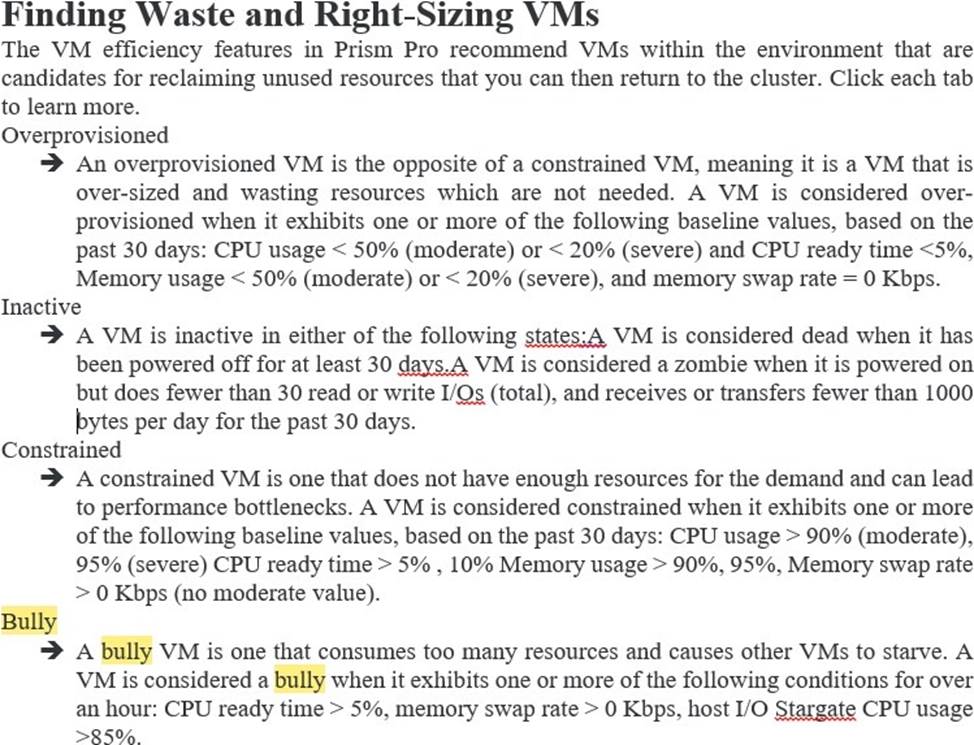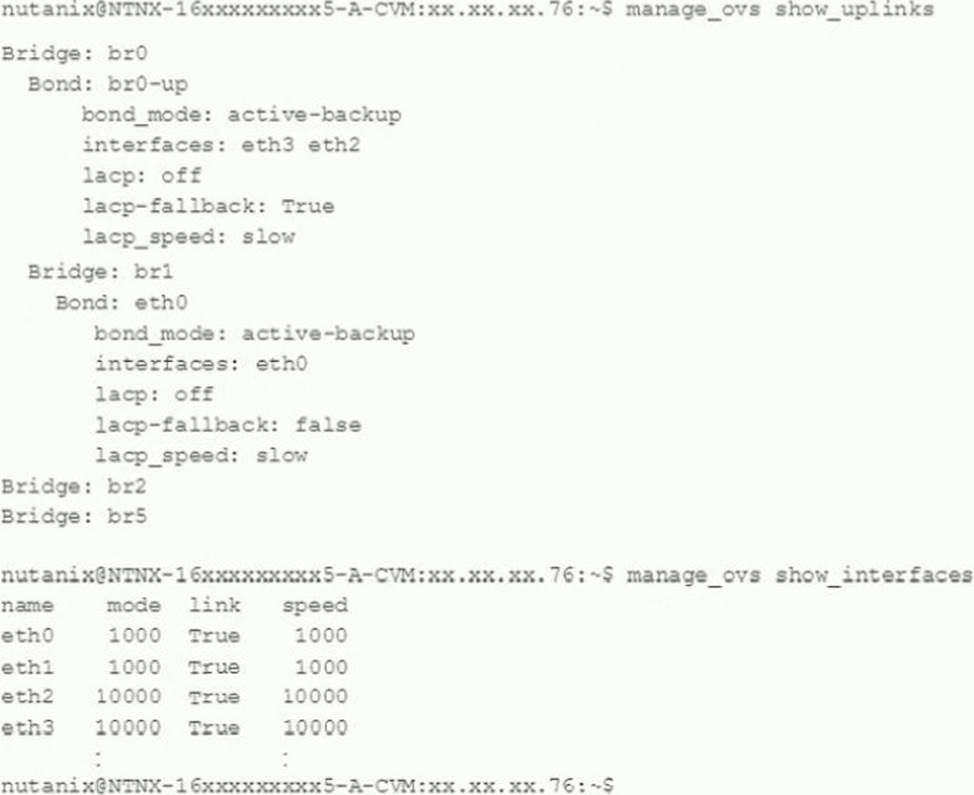Nutanix NCM-MCI-5.15 Nutanix Certified Master – Multicloud Infrastructure (NCM-MCI) 5.15 Online Training
Nutanix NCM-MCI-5.15 Online Training
The questions for NCM-MCI-5.15 were last updated at Feb 07,2026.
- Exam Code: NCM-MCI-5.15
- Exam Name: Nutanix Certified Master - Multicloud Infrastructure (NCM-MCI) 5.15
- Certification Provider: Nutanix
- Latest update: Feb 07,2026
An administrator responsible for a VDI environment needs to investigate reports of slow logins. The administrator finds that increasing the number of vCPUs from 2 to 4 will reduce the login times. Production workloads are consuming 75% of the host CPU on the cluster. The administrator increases the vCPU count on all of the VDI VMs.
What are two impacts on the cluster? (Choose two.)
- A . Increase CPU utilization%
- B . Increase CPU ready%
- C . Increase memory utilization%
- D . Increasing CPU counts will decrease memory utilization
An administrator is using Nutanix Move to migrate a Windows VM from ESXi to AHV. Automated guest preparation is failing with an error:
Account has UAC enabled error
The administrator is using the local built-in administrator account for the Windows VM Admin approval mode must remain enabled.
What should the administrator do to continue with the migration with Nutanix Move?
- A . Use a Domain Admin account for the Windows VM
- B . Reboot the Windows VM and try the migration again
- C . Follow manual VM preparation guidelines
- D . Place Windows VM in Maintenance Mode
A
Explanation:
https://next.nutanix.com/move-application-migration-19/ nutanix-xtract-validation-failed-user-must-belong-in-a-group-with-restore-files-and-directories-security-policy-31303
A VM is exhibiting one or more of the following baseline values based on the past 30 days:
• CPU usage < 20%
• CPU ready time < 5%
• Memory usage < 50% (moderately) or < 20% (severely)
• Memory swap rate = 0 Kbps
Which type of VM is being described?
- A . Constrained VM
- B . Inactive VM
- C . Bully VM
- D . Over-Provisioned VM
D
Explanation:

An administrator receives reports that VDI desktop performance in an 8-node Nutanix VDI environment is poor. Opening applications takes between 1 and 2 minutes.
When investigating the issue, the following conditions are found:
• Cluster memory utilization: 80%
• Cluster SSD utilization: 70%
• Average VM CPU Wait Time: 11%
• CVM CPU utilization: 75%
Which action should be taken to improve VDI performance?
- A . Increase the amount of SSD storage in the cluster.
- B . Add memory to the nodes in the cluster.
- C . Add CPU resources to the cluster.
- D . Increase the number of vCPU cores allocated to the CVM.
An administrator has a custom backup application that requires a 2TB disk and runs in Windows. Throughput is considerably lower than expected.
The application was installed on a VM with the following configuration:
• Four vCPUs with one core/vCPU
• 4GB of Memory
• One 50GB vDisk for the Windows installation
• One 2TB vDisk for the application
What is the recommended configuration change to improve throughput?
- A . Increase the number of cores per vCPU
- B . Increase the vCPUs assigned to the VM
- C . Span the 2TB disk across four vDisks
- D . Add 4GB of memory to the VM
A customer recently set up Async Replication between Site A and Site B. The customer wants to conduct a planned failover and clicks Activate on Site B.
The customer then runs the following command on Site A:
ncli pd deactivate_and__destroy_vms name=<protection_domain_name>
What does this do to the customer environment?
- A . VMs get deleted from Site B. and the protection domain is now Active.
- B . VMs are powered off on Site A and must be manually powered on at Site B.
- C . VMs get deleted from Site A and the protection domain is no longer active.
- D . Customer must then manually power off VMs at Site A and power them on at Site B.
C
Explanation:
http s://portal.nutanix.com/page/documents/details?targetId=Web-Console-Guide-Prism-v5_10:wc-protection-domain-failback-disaster.html
An administrator needs to forecast infrastructure requirements for a new program and its associated applications. Prior to the projected start of the new program, all existing applications will be decommissioned.
How should the administrator perform this task?
- A . Check the Disregard Existing Workloads radio button in the Runway scenario.
- B . Check the Disregard Existing Nodes radio button in the Runway scenario.
- C . Add up the recovered workloads and manually remove from the Runway configuration.
- D . Power down the workloads during a maintenance window and run the Capacity Runway.
A customer has a primary datacenter with 12 Nutanix blocks distributed across three racks. The customer wants to achieve the most resiliency possible. They also have a datacenter in a branch office that is 400 kilometers away from the primary datacenter.
Which two solutions should be used? (Choose two.)
- A . Time Stream to a remote site
- B . Async DR to a remote site
- C . Rack awareness
- D . Block awareness
An administrator inherits a new Nutanix environment and logs in to a CVM to check the network configuration.
The configuration is as follows:

Which action should the administrator take to improve network performance?
- A . Configure VLAN tagging both on br0 and br1 and their physical interfaces.
- B . Add eth0 and eth1 to the br0-up bond
- C . Configure balance-sib or balance-tcp mode for br0-up if switch configuration allows
- D . Remove one 10 Gbs interface from br0-up to make sure all 10 Gbs can be used.
An administrator is concerned that Prism will be inaccessible if Active Directory is unable to process logins.
Which method should the administrator use to access the cluster in the event of this type of outage?
- A . Manage the cluster by using the "nutanix" user on the Prism leader CVM
- B . Create and use an emergency local account on the cluster
- C . Deploy an Active Directory server locally on the cluster
- D . Manage the cluster remotely by downloading ncli to a remote workstation
Latest NCM-MCI-5.15 Dumps Valid Version with 107 Q&As
Latest And Valid Q&A | Instant Download | Once Fail, Full Refund

